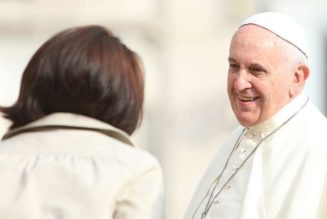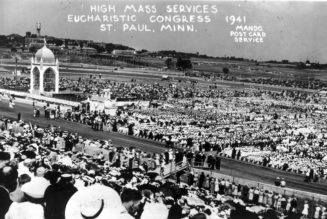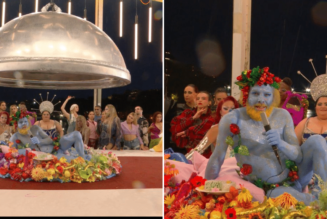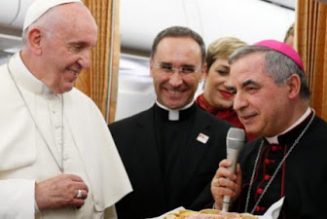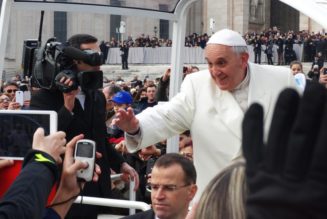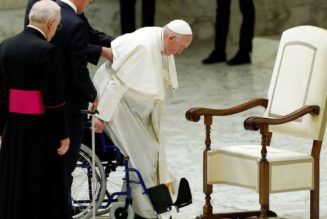By Dr. Jeff Mirus ( bio – articles – email ) | Nov 08, 2022
People are not always drawn initially toward the Church by apologetical arguments or instruction in the truths of Divine Revelation. There are many “motives of credibility” in the experience of Catholicism which draw us to Christ. A few of them are: Countless attested miracles; the sublimity of Catholic sacred music, art and architecture; the remarkable lives of particular saints; the immense diversity of the saints throughout history and around the world; the stability of Christian doctrine over time; the Church’s astonishing intellectual tradition; the scope of Christian charitable work; the attractive power of the Church’s liturgy; the courageous witness of the martyrs; the testimony of the great mystics; and the Church’s counter-witness to prevailing trends, which often impresses those who feel misgivings about what society regards as “normal”.
These motives of credibility—that is, things different people find attractive in the way Catholicism manifests itself to human perception—most often boil down to the sense that in the Church there is something distinctively human yet somehow surpassing a purely human mode of existence and action. There is, in other words, a beautiful integrity manifested by these things, and particularly by the details of a saintly life. It is hard to put our finger on the difference, but for one reason or another, many people find this or that aspect of Catholicism powerfully attractive precisely because it seems deeply rooted in a kind of wholeness in which the onlooker is drawn to participate. And so some are led to inquire into it and perhaps seek to join the Church—before they have even heard the historical and theological arguments.
This may seem a little peculiar in that many of those who are already Catholic may not be living examples of this attractive wholeness or integrity. But it is hard to keep the Church down—impossible, I would say—and something of her Divine character is reflected in many human loves and talents and achievements, just as it was reflected in Christ Himself, even in His human torment:
Behold, my servant shall prosper,
he shall be exalted and lifted up,
and shall be very high.
As many were astonished at him—
his appearance was so marred, beyond human semblance,
and his form beyond that of the sons of men—
so shall he startle many nations;
kings shall shut their mouths because of him;
for that which has not been told them they shall see,
and that which they have not heard they shall understand. [Is 52:13-15]
Through a Catholic faith manifested in Catholic works, wrought by a Church whose appearance is so marred, many are startled by their glimpse of “that which has not been told them” and seek to understand “that which they have not heard”. For despite the weakness of her members, the Church always manifests something that is, once again, certainly human and yet beyond the human mode.
Reversing the perspective
Today, however, I wish to reflect on this fascinating attraction of Catholicism from the other side—that is, from the perspective of those who have spent a lifetime in the Church and may no longer be struck by the myriad points of attraction to an outsider. Sometimes, I think, it is possible for lifelong Catholics to reverse this perspective, thinking about what things would be like if they were not Catholic after all—if, in effect, they had not ultimately chosen to live a life of grace in this Church that still not infrequently frustrates them. In their own personal reflections, they may sometimes wonder what it would be like not to be a Catholic—which, after all, they could conceivably choose for themselves at any moment. Some may consider this question in the midst of a serious interior struggle, perhaps laboring under a particular temptation, during which the question becomes a significant challenge. But others may reflect on it in a more theoretical sense, as if comparing two different lives to see better what it is that has made a Catholic life the right sort of life, and a departure from Catholicism unthinkable.
Or put it this way: There are many things a serious Catholic foregoes in the ongoing life of Faith. There may be some current temptations or tensions, certainly, but a generally settled Catholic perceives over a span of time that he or she has lived life very differently than many other people do; or at least differently from what he or she may have been once tempted to do; or even differently from what he or she did do at one time, having at some point turned away from what is now more calmly regarded as a frighteningly attractive aberration. From a more settled Catholic perspective, then, one may look back and wonder: Because I take Catholicism seriously, my life is very different than it might have been. Do I regret any part of that? Can I imagine living any other way?
Now please do not get me wrong. We raise questions about the Faith and the Church in order to find answers and explore depths in ways that strengthen our understanding. I am not advocating that someone should deliberately entertain such questions as a temptation—that someone with doubts should dwell on “what he is missing”, or that any of us should propose to ourselves alternative universes which lead to a rejection of the truth. After all, there are no alternative universes. One cannot remain a Catholic without being able to distinguish between what is real and what is not. Therefore, insofar as thinking about such things is a temptation, that temptation must be banished in prayer.
No, I raise the question in a different way entirely. Considering the motives of credibility that might attract others to the Church before they accept her doctrines, is it possible that those who have sought to live an authentically Catholic life now for many years can see something of the same thing in themselves—that is, can they see within themselves something mysteriously compelling that they could not possibly wish to be without? This question may produce genuine insights into the nature of the dreadful chasm that separates the way of Christ and the Church from every other possibility.
Integrity
Each person’s personality will probably tend toward a different focal point. But for me, the thought experiment is deeply rooted in the the same concept of “integrity” which characterizes the various motives of credibility discussed previously. It goes something like this:
If there were no Jesus Christ the Son of God, and even no knowledge of reward or punishment after death, would I regret the moral commitments I have made as a Catholic? And the answer is No. At this point, living a Catholic life has enabled in me such a clear apprehension of what it means to be integrally human that I cannot imagine myself choosing to live even in culturally-accepted ways that are so obviously contradictory to the true demands of our moral nature. For example, here is a catalogue of sins which are wildly popular, to the point that they are largely celebrated as goods, in our culture today:
- Ignoring the reality of God;
- Pursuing wealth and power for their own sakes;
- Using my own wealth purely for my own ends;
- Using others for my own financial gain or social aggrandizement;
- Behaving promiscuously, in rejection of the chastity naturally required by my state in life;
- Contracepting or aborting to suit my convenience (or any other reason);
- Destroying my family through voluntary divorce;
- Abandoning moral responsibility through a deliberate use of alcohol or drugs;
- Seeking escape in various forms of sensual excess;
- Treating people differently based on their social status;
- Exercising my rights as a citizen in accordance with my own private interests;
- Changing my moral principles as “popular opinion” shifts;
- Adopting moral relativism despite the witness of reality, history and experience;
- Ceding moral authority to the State, that is, to political interest and expediency;
- Conditioning my speech and behavior to be acceptable to social “elites”.
Now notice that the moral points I highlight here are all moral questions which fall under the natural law. I might, in raising them, be an ancient philosopher such as Plato or Aristotle, operating completely without any benefit of Divine Revelation. These moral failings are all contrary to goods that it is possible to know naturally. And I realize now, after decades of striving to live as Christ has called me to live in the Church He established for just this purpose, that I no longer wish to fall into any of these enormously widespread moral traps.
Let me make this point clear. I can still remember, both as a boy and even as a younger man, wishing many times that such-and-such was “not a sin”, as if “sin” were some arbitrary classification. This certainly reflects spiritual immaturity, for how can anyone who understands the nature of sin fail to realize that every sin is precisely the deprivation of a due good? Moreover, even now it is not that I can no longer imagine circumstances in which some sins could seem desirable. It is rather, that I would never wish to go back to a stage in life in which the real issue were not clear to me, or a time when I might still find my former sins conceptually tempting.
In other words, by taking seriously life within the Catholic Church for decades, even though “natural law” has scarcely ever been mentioned, I find that morality is no longer either just a theory or a puzzle. It is a reality compass now operative within, not primarily from personal study but rather from Jesus Christ through the sacramental life of the Church. And I recognize now that I would never wish to follow a different compass, even if my own heavenly hopes were in vain. To do so would be to give up the integrity of my own being. It would be—as a person—to disintegrate.
I remain convinced, of course, that the reason for this is the simplest possible reason: That the author of both Natural Law and Christian Revelation is the same—namely, God Himself—and that the first is revealed through what He has made, and the second through His specific plan for our salvation in Christ accompanied by a share in God’s own life. But the point of the exercise is that now I cannot imagine being happy in any denial of reality, any deprivation of this gifted yet interior sense of right and wrong. Even if I knew I would not be punished for transgressions, both now and forever, I can no longer imagine changing my life to accommodate any of the evils I have listed above. I simply could not be happy living like that.
A motive of credibility in reverse
I am conducting this thought experiment “out loud” only in case it might be beneficial to readers. Again, I do not claim that I can no longer sin. Let us not speak of sins of omission! Moreover, I could too easily prove myself wrong in a thoughtless moment. Or I might encounter a temptation that succeeds in convincing me I am too weak to bear it—as if it all depends on me. I do not want to enlarge the target on my back, but I can claim at least that (like most of my readers) I am no longer a teenager—that I no longer want to find a way to justify a sin, that I never want to offer an excuse again, and that I do not believe I could choose to live otherwise even if the promises of Christ were suddenly rescinded.
This may border on lunacy, but we are talking now of something that, through grace, has become part of my own nature, an integrity of nature I have certainly not always possessed (and of course do not possess wholly quite yet). Even granted that a man is a poor judge in his own case, I know that my very being has been significantly transformed by a Catholic life, that I am more truly, integrally human than I was when I began it, and that I cannot imagine finding any happiness at all in the rejection of even the least aspect of its moral demands.
I do not know if this thought experiment, or any similar one, will be helpful to anyone else. But what it does for me—without making any claim to special virtue—is to allow me to see with increasing clarity that whatever goodness has been strengthened within me by God’s grace has been ordered, in a distinctively Catholic way, to the illumination of the human person I am and of the natural moral sense I am supposed to possess precisely by virtue of being a human person. I do not mean to say that I am without sin or that I could never be guilty of pride or presumption or greed or lust or cupidity. But I do mean I cannot imagine myself wanting to fall back into the habit of ignoring the moral reality which I can now see so clearly—that very human reality into which we have all been born.
I hope, at least, that I could never prefer to live in that moral fog in which we so easily hide ourselves when we want what we really know deep down we should not want, or we choose what we know deep down we should not choose. Instead I am able to recognize that, by believing in Christ and the Church for as long as I can remember, I can see now very clearly that Christ is not only the perfection of our humanity but the source and recovery point of our own human integrity. By a miracle of grace, if we cooperate in the Catholic life, we will see nature whole, and not only see it whole in our minds but feel it whole in both body and soul. We will not want to return to the partial and distorted vision we almost certainly had before.
This gives me even greater confidence in the Catholic Faith. This is what I mean by a motive of credibility in reverse.
Sound Off! CatholicCulture.org supporters weigh in.
All comments are moderated. To lighten our editing burden, only current donors are allowed to Sound Off. If you are a current donor, log in to see the comment form; otherwise please support our work, and Sound Off!

There are no comments yet for this item.
Join Our Telegram Group : Salvation & Prosperity


